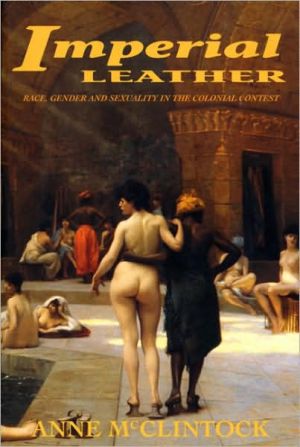Imperial Leather: Race, Gender, and Sexuality in the Colonial Conquest
Imperial Leather chronicles the dangerous liaisons between gender, race and class that shaped British imperialism and its bloody dismantling. Spanning the century between Victorian Britain and the current struggle for power in South Africa, the book takes up the complex relationships between race and sexuality, fetishism and money, gender and violence, domesticity and the imperial market, and the gendering of nationalism within the zones of imperial and anti-imperial power.
Search in google:
Imperial Leather chronicles the dangerous liaisons between gender, race and class that shaped British imperialism and its bloody dismantling. Spanning the century between Victorian Britain and the current struggle for power in South Africa, the book takes up the complex relationships between race and sexuality, fetishism and money, gender and violence, domesticity and the imperial market, and the gendering of nationalism within the zones of imperial and anti-imperial power.Anne McClintock explores the sexualizing of the terra incognita, the imperial myth of the empty lands, the dirt fetish and the "civilizing mission", sexuality and labor, advertising and commodity racism, the Victorian invention of the idle woman, feminism and racial difference, and anti-apartheid culture in the current transformation of national power.Using feminist, post-colonial, psychoanalytic and socialist theories, Imperial Leather argues that the categories of gender, race and class do not exist in isolation, but emerge in intimate relation to one another. Drawing on diverse cultural forms--novels, advertising, diaries, poetry oral history, and mass commodity spectacle--the book examines imperialism not only as a poetics of ambivalence, but as a politics of violence. Rejecting traditional binaries of self/other, man/woman, colonizer/colonized, Anne McClintock calls instead for a more informed and complex understanding of catgories of social power and identity. Library Journal McClintock (English, Columbia Univ.) interprets 19th-century British imperialism as the focal point for that era's major "disclosures," including feminism, Marxism, and psychoanalysis. She describes Victorian urban spaceincluding advertisingas being oriented to exhibit imperial spectacle based on racism and sexism. In turn, the colonies become stages for exhibiting a reinvented patriarchy, with Westerners symbolizing power and indigenous peoples a subdued domesticity. The text is an exercise in demonstrating preconceptions. While some of McClintock's evidence is original, the argument as a whole is conventional bien-pensant wisdom unlikely to convince anyone not already committed to the thesis. The presentation is further burdened by its reliance on the clichs and jargon of feminism, deconstructionism, and other currently fashionable academic ideologies. Imperialism was at once a simpler and a more complex phenomenon than McClintock's perspective allows. For large academic collections only.D.E. Showalter, Colorado Coll., Colorado Springs
AcknowledgmentsIntroduction: Postcolonialism and the Angel of Progress11Empire of the Home181The Lay of the Land: Genealogies of Imperialism212"Massa" and Maids: Power and Desire in the Imperial Metropolis753Imperial Leather: Race, Cross-dressing and the Cult of Domesticity1324Psychoanalysis, Race and Female Fetishism1812Double Crossings2045Soft-Soaping Empire: Commodity Racism and Imperial Advertising2076The White Family of Man: Colonial Discourse and the Reinvention of Patriarchy2327Oliver Schreiner: The Limits of Colonial Feminism2583Dismantling the Master's House2968The Scandal of Hybridity: Black Women's Resistance and Narrative Ambiguity2999"Azikwelwa" (We Will Not Ride): Cultural Resistance in the Desperate Decades32910No Longer in a Future Heaven: Nationalism, Gender and Race352Postscript: The Angel of Progress391Notes397List of Illustrations434Index440
\ Library JournalMcClintock English, Columbia Univ. interprets 19th-century British imperialism as the focal point for that era's major "disclosures," including feminism, Marxism, and psychoanalysis. She describes Victorian urban spaceincluding advertisingas being oriented to exhibit imperial spectacle based on racism and sexism. In turn, the colonies become stages for exhibiting a reinvented patriarchy, with Westerners symbolizing power and indigenous peoples a subdued domesticity. The text is an exercise in demonstrating preconceptions. While some of McClintock's evidence is original, the argument as a whole is conventional bien-pensant wisdom unlikely to convince anyone not already committed to the thesis. The presentation is further burdened by its reliance on the clichs and jargon of feminism, deconstructionism, and other currently fashionable academic ideologies. Imperialism was at once a simpler and a more complex phenomenon than McClintock's perspective allows. For large academic collections only.D.E. Showalter, Colorado Coll., Colorado Springs\ \








